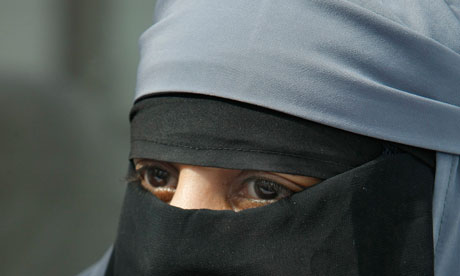Last Monday the visages découverts, or open faces, law came into effect in France. If you take the headlines at face value, the law is a means of persecuting Muslim women by banning the burqa and the niqab, face-covering veils worn in accordance with cultural-religious tradition by about 2000 women, in all public places. The French government thought it was sneaky enough not to make this ban explicit and targeted; on paper, visages découverts prohibits anything that obscures the full face from view. So then whom else does it affect? Bank robbers? Beekeepers? Batman? Clearly this law not-so-subtly targets Muslim women who wear a niqab, especially when considering that it includes heavier fines and prison time for anyone who forces someone out in public with an offending face covering—a common accusation tossed at the husbands and other male family members of observing women. Who knew politically correct ambiguity could be so prejudicially clear?
Pictured: Kenza Drider, 32, was detained for wearing her niqab in front of the Notre Dame Cathedral.
The government claims this is all for security reasons, so that threatening individuals cannot cover their faces in order to gain entrance somewhere they do not belong or to evade pursuing authorities. Every time I hear this, I can’t help but think of Sex and the City 2 when Carrie Bradshaw and Co. borrow burqas from fashionable Muslim women to escape an angry mob in Abu Dhabi—an angry mob chasing them down the streets after Samantha infuriates them by wearing shorts and carrying condoms. Are heavily stereotyped American movies where the French officials are finding their information about the nefarious uses of the burqa? It seems ridiculous to suggest that a bank robber, terrorist, or any other criminal would try to get away with that; many women who choose to wear the burqa say they would willingly reveal their face to an official who asked politely for identification purposes. It shouldn’t take discriminatory legislation for law enforcement to be suspicious of anyone adamantly refusing to show their face in relevant security circumstances.
Popular speculation is that Sarkozy pushed the law into effect to satisfy the far-right (read: anti-immigration and hyper-nationalist) French, particularly those belonging to the National Front Party. By banning all face-covering veils, Sarkozy has found a palatable way to outlaw a visible Islamic tradition and force assimilation. This isn’t the first attempt at homogenization sanctioned by the French government; a 2004 law banned niqabs as well as hijabs in public schools. However, the ban was not limited to forms of Muslim religious expression; it outlawed all religious wardrobe choices, including skullcaps and crosses. At least then it was equal opportunity religious repression in the name of nationalism, and not something as clearly Islamophobic as visages découvertes.
The press has jumped at the chance to criticize the Islamophobia inherent in the law; one op-ed ran with the title “France’s burqa ban: Has Europe forgotten the gas chambers?” However, sensationalism aside, visages découvertes seems to aim more at national identity building than persecution. Sarkozy crossed a line with this one, but it was a misguided effort at creating a unified France rather than a blatant attack on Islam. It probably seemed particularly convenient to target the niqab to placate the vicious far-right, but the motives lie in something less bigamous. Sarkozy didn’t outlaw veils because he thinks every woman in a niqab is a suicide bomber, but that sure is what it looks like. The French president and all of France appear religiously intolerant and oppressive, and appearance means a lot in international relations. The perception that France is anti-Muslim has created a backlash in Turkey and will certainly cause further problems. Beyond the reputation-damaging nature of the legislation, it should go without saying that it is essentially wrong to restrict religious freedom that does no harm to others. The law certainly needs to be repealed, and the French government needs to find some other less offensive and repressive way to unite its citizenry; punishing women for or restricting them from wearing their traditional religious or cultural dress with drive people apart, not bring them together.
But for now, citizens of France, don't plan on rocking a mask for Halloween.

Really strong post. On one hand, I really agree. Religious freedom is one of the couple key tenets of American ideology and government, and it undeniably is scary to see what is happening in France.
ReplyDeleteHowever, there is another side that must be considered. How would native muslims react to a white westerner coming to their school (in their country) and actually refusing to wear a burqa? Wouldn't the muslims be likely to have the same reaction, and force the westerner to adapt? As much as I am in favor of religious freedom, to some extent the logic of "this is our country, live by our rules or don't live here" is at least partially fair, no matter how insensitive it may seem. Countries have different rules for a reason.
Just some things to think about, but overall I loved the post and I am with you in your fear of where limiting religious freedoms might lead to...